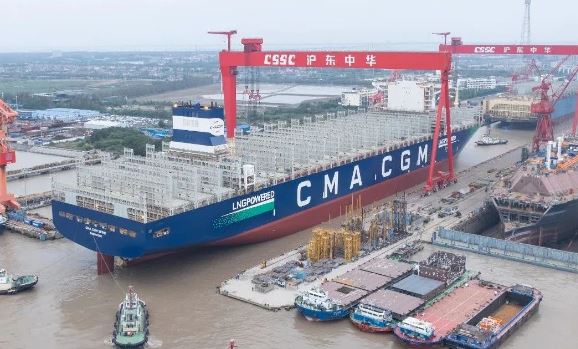 On November 20, the world's largest 24,000 TEU liquefied natural gas (LNG)-powered and dual-fuel ultra-large container ship built by Hudong-Zhonghua, a subsidiary of China State Shipbuilding Corporation, was successfully undocked 10 days ahead of schedule, according to China Shipbuilding Group's release.
On November 20, the world's largest 24,000 TEU liquefied natural gas (LNG)-powered and dual-fuel ultra-large container ship built by Hudong-Zhonghua, a subsidiary of China State Shipbuilding Corporation, was successfully undocked 10 days ahead of schedule, according to China Shipbuilding Group's release.
The ship is the first in a series of four 24,000 TEU dual-fuel container ships ordered by CMA CGM Group, designed by China Shipbuilding Group 708, and is an upgraded and optimized Hudong-Zhonghua container ship following the completion and delivery of the world's first 23,000 TEU dual-fuel container ship in September 2020.
It can carry 220,000 tons of cargo, 23,872 containers at a time, 2,200 standard refrigerated containers, the maximum number of container layers is 24 layers, equivalent to 22 floors in height.
As the world's largest dual-fuel container ship, its main feature is that it has a unique "green heart" with 18,600 cubic meters of MARK III membrane fuel tanks installed, and the loaded LNG can provide nearly 20,000 nautical miles of "green energy" in one voyage.
Compared with the same type of tanker ship, the ship's carbon dioxide emissions are reduced by about 20%, nitrogen oxide emissions are reduced by up to 85%, and particulate matter and sulfur oxide emissions are reduced by 99%, which greatly reduces environmental pollution.
Therefore, this "Sea Hulk" will become another model of the world's high-end marine equipment, and its high-end, intelligent and environmentally friendly design will be highly praised by ship owners and the industry. It is understood that Hudong-Zhonghua currently has a total of 5 ultra-large container ships under construction at the same time, and has placed more than 30 orders for ultra-large and large container ships, with production tasks planned until 2028.



